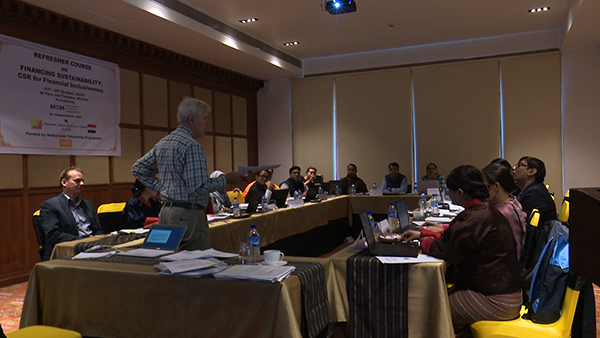 To further develop knowledge and skills on the development of Corporate Social Responsibility Strategies, inclusive finance methods and policies, the first-ever refresher course on Corporate Social Responsibility for financial inclusiveness was conducted in the country, recently.
To further develop knowledge and skills on the development of Corporate Social Responsibility Strategies, inclusive finance methods and policies, the first-ever refresher course on Corporate Social Responsibility for financial inclusiveness was conducted in the country, recently.
The course is expected to enhance knowledge on innovation and Corporate Social Responsibility (CSR) policy development, and build a sustainable business strategy in the country.
CSR is a company’s sense of responsibility towards the community and environment in which it operates. CSR aims to ensure that companies conduct their business in a way that is ethical and take account of their social, economic and environmental impact, and consider human rights as well.
The programme is expected to give participants the possibility to further develop their skills and knowledge in areas which are of importance to the region and to the organizations the alumni are working in.
“Financial inclusion is a very hot topic these days and this is a really important aspect we want to bring forward in this course. More than 2.5 billion people do not have a bank account these days. So this course tries to see to what extent the CSR programme can be linked to this issue of financial inclusion,” said Diederik de Boer (PhD), the Director International Projects and Consultancies at Maastricht School of Management
“CSR and Financial inclusiveness are very urgent and important phenomena especially in the financial sector as of now, in Bhutan. So this requires knowledge and capacity development. So this course will give the alumni the opportunity to further develop their skills and knowledge in these areas which are of utmost importance to the region and Bhutan also,” said Rinchen Zangmo, the Organizer.
The refresher course not only saw participants from Bhutan but also from India, Bangladesh, Nepal, Thailand and Vietnam.
“When it comes to CSR, it talks about our responsibilities in making this world a better place to live and in the sense our responsibilities and some of the challenges faced by the communities such as poverty, waste management, carbon emission and unemployment,” said Sangay Wangdi, a Participant from Bhutan.
“CSR is still in the public forum but not in that way, that common understanding has not been built in our society. I am talking about this from my observation as well as working for the promotion of worker’s right,” said Rajwa Kamal, a Participant from India.
“Definitely this course was very helpful for me in my career and in my professional life since I got a lot of inputs like national sustainability, how you have to look into a project and how we want to make it look in an inclusive way,” added Shadan Kumar Das, a Participant from Bangladesh.
Besides gaining knowledge on Corporate Social Responsibility and Inclusive finance, participants were also exposed to different local practices on financial inclusion, CSR and the usage of the human happiness index.
The Maastricht School of Management in collaboration with the Netherlands Alumni Association of Bhutan conducted the week-long programme.
Passang Dorji








